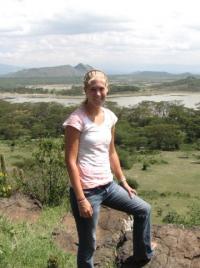Article
My Experience with Carolina Navigators
ID # 3710
Through working with Carolina Navigators, I have gained an immense amount of knowledge about how to share intercultural experiences, how to write lesson plans, how to work with a diverse group of students, how to evaluate my own perspective and that of others. I have analyzed my experiences abroad and delved deeper into the issue of stereotypes of Africa with students of all ages. I have worked with elementary school students, middle school students, and high school students. I have met an amazing group of North Carolina educators, including the fellow students in my class.
Africa is not a Country: a seemingly simple fact for many but unfortunately not for all. Many misconceptions exist regarding the African continent. Carolina Navigators has provided me the opportunity to break down these stereotypes through sharing my knowledge and experiences abroad with students throughout North Carolina. I wish to share with you the positive results two of my presentations had on students in a third grade and seventh grade class.
A third grade class understanding of cultural differences
I was showing a third grade class how to put on a gomazi, a traditional dress for women in Uganda. Several of the students exclaimed That looks weird! or Thats strange! My response to these comments was Why do you think it looks weird? A brief moment of silence and one student speaks up. I think I get it now. We think it looks weird because no one in the United States wears that. Weve never seen it before, but in Uganda, people wear it a lot and so it is not weird to them. They might even think what we wear is weird! She got it. The class came to the understanding that all people are different but differences do not make any culture wrong. Its moments like these, when students have an ah-ha! moment, that remind me why I enjoy teaching and sharing my international experiences with students. Im able to share with them a piece of my knowledge to which they may not have otherwise been exposed.
A seventh grade class realization of the negative effects of stereotypes
After discussing why people have certain negative and generalized perceptions of the African continent, the students played a game of African Jeopardy. Divided into five groups, I gave each group the opportunity to select one category for the game Music, Artifacts, Geography, Defying common beliefs (identifying and explaining stereotypes), Dress, Language, Miscellaneous Challenge (could be anything!), and Social Activities. I was pleased when one of the groups chose the category Defying Common Beliefs. The questions of this category identify common misconceptions or stereotypes, and the students are asked to explain why the stereotype exists and what effects it has on peoples understanding of the African continent. For the students in this class, this category was the most popular.
The Final Jeopardy question continued the theme of defying misconceptions. The student groups provided thoughtful answers to the question: How might stereotypes or misconceptions have formed around the cultures of Africa we have discussed throughout the lesson? With the knowledge you have now, how can we, as students, work to remove these stereotypes? Here are two of the groups responses, copied directly from the words they wrote:
The misconceptions are more important than the regular traditions in Africa. [Further explanation clarified that the media portrays events that will attract an audience, events that are widespread and news-worthy. These events are often negative and give a single story impression of a country or the continent.] We can make a movie of Africas traditions to show the side of life that is not shown by the media and then post it on YouTube.
Misconceptions are formed through the media, books, movies, and the internet. To break down these stereotypes, we can do presentations to show them what Africa really is like, presentations such as the one you are doing today. We can talk to people about Africa. We can do activities to see what they think and show them that its not necessarily true.
In seventy-five minutes, these seventh grade students learned that Africa is not all Hot, Poor, Full of Animals, Dry, Black, Wild, Forest, Desert (words the students used to describe Africa in the opening activity). It is a vast continent made up of numerous diverse countries, none of which can be defined in simplistic terms.
These two classroom experiences reveal the positive effects Carolina Navigators has on students in North Carolina. I am proud to be a part of this program, and I encourage all educators to take advantage of its resources.
Created By
Leslie Willis
